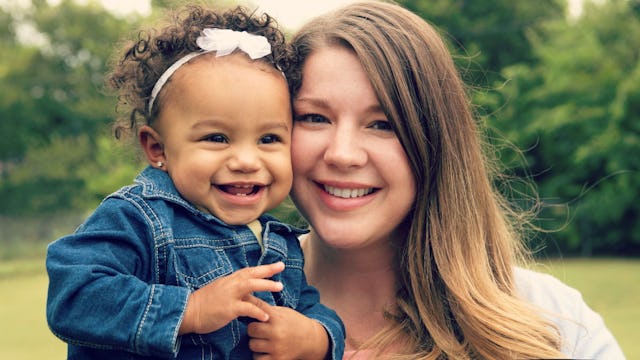I Don’t Owe You Any Explanation For My Transracial Family

Like many other transracial adoptive families, when my kiddo and I head out into the world, we tend to get a little more attention than the average mom and baby duo. I’d like to think it’s because she’s disgustingly adorable (she is) or because I am some sort of 36-year-old undiscovered supermodel (my BMI and incredible ability to only look awkward in photos would suggest otherwise).
A lot of the attention we get is positive. She is a happy baby who generally is either quiet or laughing. I shouldn’t be saying this out loud because I know I’m jinxing myself here, but she pretty much never has a meltdown in public as long as she’s fed and rested. For a 1-year-old, I’ll admit that’s pretty abnormal, and I don’t doubt that at some point that may change and I’ll be carrying her out of Target over my shoulder like a screaming sack of potatoes.
Those comments I welcome. I mean, who doesn’t want to be told that their kid is awesome? But there are other comments, questions, double-glances, and other general annoyances that I could really do without. My daughter is black. I am what I like to call “aggressively caucasian.” I have relatively fair skin and blue eyes. My husband is even fairer than I am and basically explodes when he comes in contact with direct sunlight.
There is no doubt to anyone who observes us that this child did not come sliding headfirst out of my nether regions. Yes, she was adopted at birth. Yes, raising a child of a different race, especially raising a black child in America, will bring with it a host of considerations and possible challenges we wouldn’t have faced had we adopted a child as “aggressively caucasian” as we are. We know this. We read books about it. We took online courses about it. We talked to friends who had adopted transracially. We thought long and hard about it before we decided what races we were open to on our agency’s questionnaire.
I understand people are curious. Some are genuinely interested in learning more about adoption as a means of growing their own family, or have their own personal connection to adoption. Those people tend to be polite and ask a few short questions — what agency we used, what a home study really entails — before saying, “Congratulations, she’s beautiful,” and then getting out of my way in the toilet paper aisle. I appreciate those people, and no matter how frazzled or greasy or tired I am, I try to be polite and thankful and helpful.
The problem is, there’s a second kind of person, and often you can’t tell if you’re dealing with a Type 1 Lookee-loo or a Type 2 Lookee-loo until it’s too effing late. These are the people who want to know how old her birth mother is and who make terrible assumptions about her as a person. They pretend to be just curious, but what they really want is for me to tell them a story that affirms their own internal biases against women, people of color, whatever. They have an agenda, and their agenda is based on feeling superior to other people, and I don’t have any time for it. I am not a one-woman adoption education and racial tolerance counselor. I don’t owe you my time, my life story, my daughter’s story, or any other detail about how my family came to be. I don’t owe you that. I don’t owe you anything.
Some adoptive parents think otherwise, that part of being an adoptive parent means that you are an ambassador for adoption and you need to answer people’s questions in a way that celebrates adoption no matter what, wherever and whenever and however they ask them, and I get that. I think that’s noble, and maybe those people are nicer than me.
For me, adoption was how we chose to build our family. Families make these kinds of decisions every day — husbands get vasectomies when they realize their family is complete, or parents make decisions about when to start “trying” again so they can have their kids spaced out in a way they think will work for them. Increasingly, hopeful parents also try fertility treatments to build their family.
The only difference between their decisions and mine is that their decisions aren’t visible. Would you walk up to a woman with several kids who appeared to be close in age and ask her why she didn’t have her kids further apart? Would you walk up to a family with one child and ask them if they’ve started trying for a second? Probably not. At least you wouldn’t ask these questions of a total stranger. So why then is it okay to ask invasive questions of a family who appears to have become parents via adoption? It shouldn’t be.
I’m not asking for much here, people. I just want to be able to fondle the melons in peace like the rest of you and internally groan about how expensive avocados are. I just want to get distracted by the cute tops at Target and end up spending $75 when I only came in for toilet paper. I just want to push my kid on the swing at the park to tire her out so she’ll sleep well. That’s what most normal parents do when they’re outside their homes, and newsflash, we’re just a normal family too.